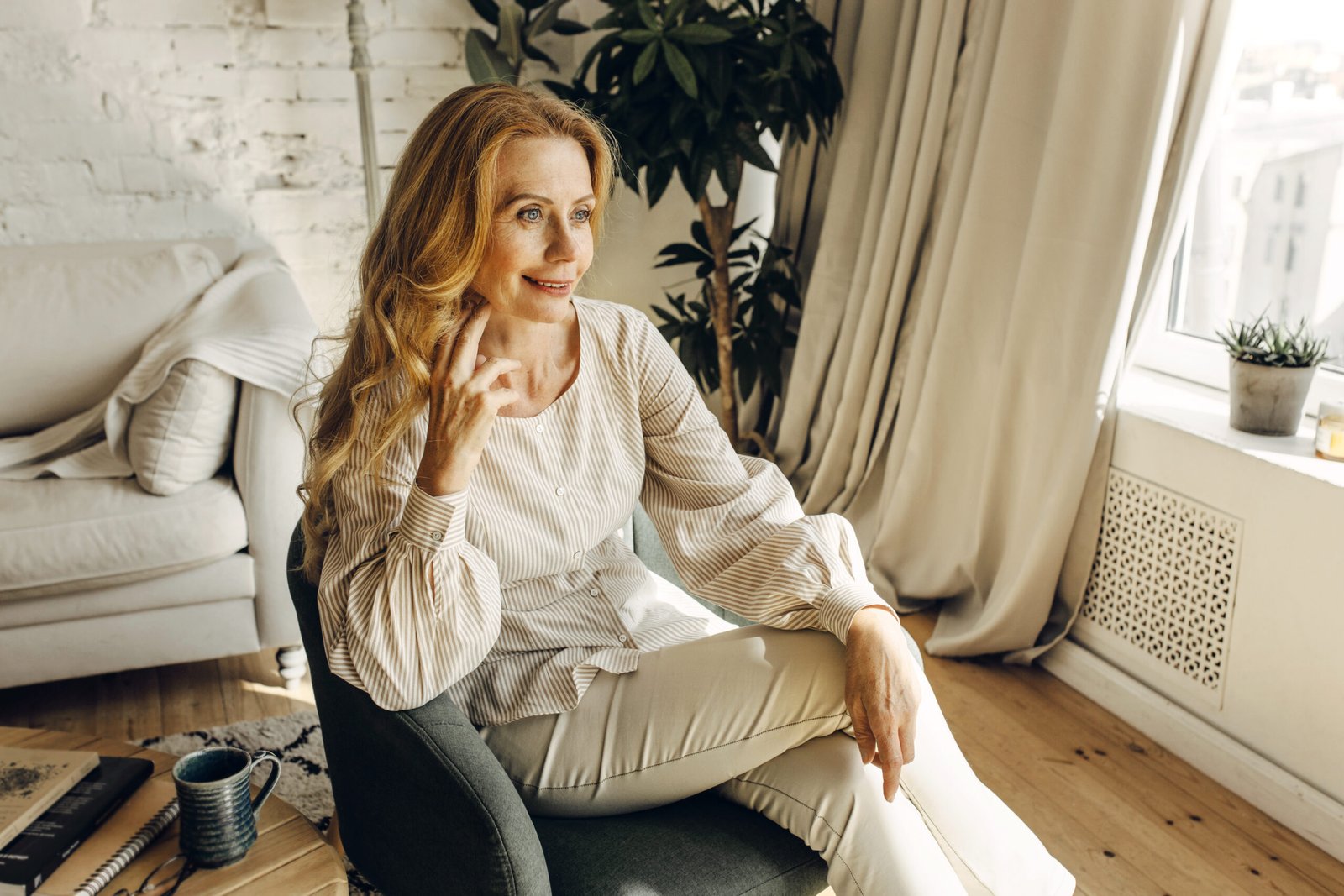
Elegant, charming, beautiful mature woman sitting in lovely stylish chair posing in surroundings of modern living-room, resting after reading favorite book, dressed in striped blouse and suit pants
Unlocking Freedom: Transform Your Relationship with Compulsive Behaviors Through Inner Child Work
You’re tired of feeling trapped by compulsive behaviors, aren’t you? It’s like being stuck in a loop where relief is always out of reach. But what if the answer lies in reconnecting with a part of yourself you’ve long forgotten—the inner child? Through Inner Child Work, you can break free, reclaim your self-worth, and find emotional healing. Ready to start your journey toward freedom and transformation? VK Circle’s compassionate coaching can help you step into a future where self-love and acceptance are your guiding lights.
Embracing Inner Child Work

Inner Child Work offers a powerful method to reshape your relationship with compulsive behaviors. By reconnecting with your inner child, you can access emotional healing and reclaim self-worth. Let’s explore how this approach can be a cornerstone in fostering emotional freedom.
Understanding Your Inner Child
Inner Child Work is a therapeutic process that involves reconnecting with the childlike aspect of your personality. This part of you holds emotions, memories, and experiences from your formative years. Recognizing and nurturing your inner child can lead to profound emotional healing.
The concept of the inner child emphasizes that past experiences shape present behaviors and emotions. According to Verywell Mind, unresolved childhood issues can manifest as compulsive behaviors in adulthood. Addressing these issues offers a path to healing.
Often, our inner child is hidden beneath layers of adult responsibilities and coping mechanisms. By acknowledging and accepting this part of ourselves, we can better understand the roots of our compulsive behaviors. As Zencare notes, this work can lead to increased self-awareness and emotional release.
How Compulsive Behaviors Develop
Compulsive behaviors often develop as coping mechanisms in response to unmet needs or unresolved trauma from childhood. These behaviors can provide temporary relief but frequently result in long-term emotional distress.
Understanding the development of these behaviors requires examining the emotional and psychological triggers that originate in childhood. MedCircle suggests that identifying these triggers is crucial for breaking the cycle of compulsive actions.
A key insight is that compulsive behaviors often mask deeper emotional pain. By addressing the underlying issues through Inner Child Work, individuals can find healthier ways to meet their emotional needs. It’s a process of transforming understanding into healing.
The Role of Emotional Healing

Emotional healing plays a pivotal role in overcoming compulsive behaviors. By addressing the root causes of these behaviors, individuals can reclaim their self-worth and attain emotional freedom.
Reclaiming Self-Worth
Reclaiming self-worth is essential for anyone struggling with compulsive behaviors. Often, these behaviors stem from a lack of self-esteem and a disconnection from one’s true self. Through Inner Child Work, individuals can reconnect with their inherent worthiness.
Self-worth is not something that can be externally validated. It must come from within. By nurturing your inner child, as Joane Childs highlights, you can rebuild a sense of self-love and acceptance.
This process involves recognizing your intrinsic value and letting go of negative beliefs formed in childhood. When you see yourself as worthy, you’re less likely to rely on compulsive behaviors for emotional fulfillment. Embracing this new perspective fosters a healthier, more compassionate relationship with yourself.
Pathways to Emotional Freedom
Achieving emotional freedom means breaking free from the grip of compulsive behaviors and embracing a life of authenticity and self-acceptance. Here are some pathways to achieve this:
Awareness: Recognize and understand the triggers of your compulsive behaviors.
Acceptance: Embrace all parts of yourself, including your inner child.
Healing: Engage in therapeutic practices like Inner Child Work to address past trauma.
Growth: Replace unhealthy coping mechanisms with constructive habits.
These steps are part of a continuous journey towards emotional health. By committing to this path, you can transform your relationship with yourself and the world around you.
VK Circle’s Holistic Coaching

VK Circle offers a supportive environment for individuals seeking to overcome compulsive behaviors. Through holistic coaching, they guide clients in reclaiming emotional freedom and self-worth.
Heal Your Life® Methodology
The Heal Your Life® methodology is a cornerstone of VK Circle’s approach. This method focuses on nurturing the inner child and fostering emotional healing in a non-clinical setting.
The process is designed to be compassionate and supportive. Participants are guided through exercises that promote self-reflection and emotional release. As part of this methodology, VK Circle helps individuals understand how past experiences influence current behaviors.
By employing this comprehensive approach, clients can achieve deeper insights into their emotional patterns. This understanding is crucial for breaking free from compulsive behaviors and moving towards a more fulfilling life.
90-Day Emotional Freedom Program 🌟
VK Circle’s 90-Day Emotional Freedom Program is designed to provide structured support and guidance for those looking to reclaim their self-worth and emotional health. Here’s what the program offers:
Personalized Coaching: Tailored sessions to address personal challenges and goals.
Weekly Support: Regular check-ins to monitor progress and make adjustments.
Practical Exercises: Engaging activities that promote emotional healing and self-discovery.
By the end of the program, participants often experience increased emotional freedom and a renewed sense of self-worth. This transformative journey empowers individuals to break free from the cycle of compulsive behaviors and embrace a life of self-love and acceptance. 🌟



